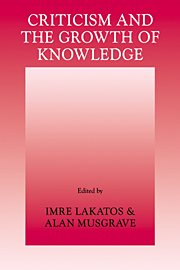 Criticism and the Growth of Knowledge
Criticism and the Growth of Knowledge Published online by Cambridge University Press: 05 August 2014
1. Introduction.
2. Methodology: the role of history and sociology.
3. Normal Science: its nature and functions.
4. Normal Science: its retrieval from history.
5. Irrationality and Theory-Choice.
6. Incommensurability and Paradigms.
INTRODUCTION
It is now four years since Professor Watkins and I exchanged mutually impenetrable views at the International Colloquium in the Philosophy of Science held at Bedford College, London. Rereading our contributions together with those that have since accreted to them, I am tempted to posit the existence of two Thomas Kuhns. Kuhn is the author of this essay and of an earlier piece in this volume. He also published in 1962 a book called The Structure of Scientific Revolutions, the one which he and Miss Master-man discuss above. Kuhn is the author of another book with the same title. It is the one here cited repeatedly by Sir Karl Popper as well as by Professors Feyerabend, Lakatos, Toulmin, and Watkins. That both books bear the same title cannot be altogether accidental, for the views they present often overlap and are, in any case, expressed in the same words. But their central concerns are, I conclude, usually very different. As reported by his critics (his original has unfortunately been unavailable to me), Kuhn seems on occasion to make points that subvert essential aspects of the position outlined by his namesake.
Lacking the wit to extend this introductory fantasy, I will instead explain why I have embarked upon it.
To save this book to your Kindle, first ensure no-reply@cambridge.org is added to your Approved Personal Document E-mail List under your Personal Document Settings on the Manage Your Content and Devices page of your Amazon account. Then enter the ‘name’ part of your Kindle email address below. Find out more about saving to your Kindle.
Note you can select to save to either the @free.kindle.com or @kindle.com variations. ‘@free.kindle.com’ emails are free but can only be saved to your device when it is connected to wi-fi. ‘@kindle.com’ emails can be delivered even when you are not connected to wi-fi, but note that service fees apply.
Find out more about the Kindle Personal Document Service.
To save content items to your account, please confirm that you agree to abide by our usage policies. If this is the first time you use this feature, you will be asked to authorise Cambridge Core to connect with your account. Find out more about saving content to Dropbox.
To save content items to your account, please confirm that you agree to abide by our usage policies. If this is the first time you use this feature, you will be asked to authorise Cambridge Core to connect with your account. Find out more about saving content to Google Drive.